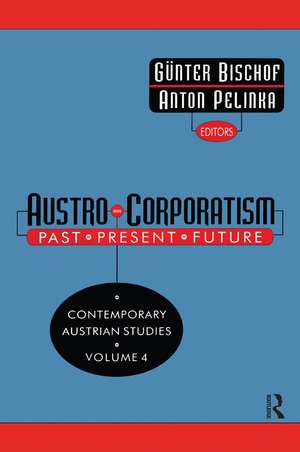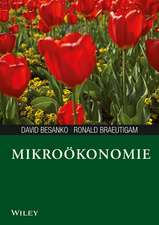Austro-corporatism: Past, Present, Future: Contemporary Austrian Studies
Autor Gunter Bischofen Limba Engleză Paperback – 30 ian 1995
The contributors include specialists on Austria from all parts of the world, making this a truly international effort. Andrei Markovits provides the larger European context for this analysis of Austrian corporatism. Emmerich Talos and Bernhard Kittel review the historical development of Austrian corporatism, going back to its nineteenth-century roots. Randall Kindley studies the institutional framework of Austrian corporatism, particularly its post-World War II reincarnation. Hans Seidel looks at the subject from a neo-Keynesian economic perspective, and Ferdinand Karlhofer at the chances of its survival in a changing international environment.
Jonathan Petropoulos presents a fascinating biographical study of Nazi art plunderer Kajetan Muhlmann, and David McIntosh compares Eisenhower's policy vis-a-vis the small friendly countries of Lebanon, Costa Rica, and Austria. A special forum looks at the model character and appeal of tripartite Austrian cooperation among its new eastern democratic neighbors: the Czech Republic, Slovakia, Hungary, and Slovenia. A number of reviews of Austrian politics in 1994 complete the volume. Austro-Corporatism will be of intense interest to foreign policy analysts, historians, and scholars concerned with the unique elements in Central European politics.
| Toate formatele și edițiile | Preț | Express |
|---|---|---|
| Paperback (1) | 406.54 lei 6-8 săpt. | |
| Taylor & Francis – 30 ian 1995 | 406.54 lei 6-8 săpt. | |
| Hardback (1) | 657.34 lei 6-8 săpt. | |
| Taylor & Francis – 18 dec 2020 | 657.34 lei 6-8 săpt. |
Preț: 406.54 lei
Nou
Puncte Express: 610
Preț estimativ în valută:
77.80€ • 80.61$ • 64.93£
77.80€ • 80.61$ • 64.93£
Carte tipărită la comandă
Livrare economică 22 martie-05 aprilie
Preluare comenzi: 021 569.72.76
Specificații
ISBN-13: 9781560008330
ISBN-10: 1560008334
Pagini: 434
Dimensiuni: 152 x 229 x 23 mm
Greutate: 0.54 kg
Ediția:1
Editura: Taylor & Francis
Colecția Routledge
Seria Contemporary Austrian Studies
Locul publicării:Oxford, United Kingdom
ISBN-10: 1560008334
Pagini: 434
Dimensiuni: 152 x 229 x 23 mm
Greutate: 0.54 kg
Ediția:1
Editura: Taylor & Francis
Colecția Routledge
Seria Contemporary Austrian Studies
Locul publicării:Oxford, United Kingdom
Cuprins
Introduction, Topical Essays, Andrei S. Markovits, Austrian Corporatism in Comparative Perspective, Emmerich Talos and Bernhard Kittel, Roots o f Austro-Corporatism: Institutional Preconditions and Cooperation Before and After 1945, Randall W. Kindley, The Evolution o f Austria's Neo-Corporatist Institutions, Hans Seidel, Social Partnership and Austro-Keynesianism, Ferdinand Karlhofer, The Present and Future State of Social Partnership, FORUM: Austrian Social Partnership— A Model for Central and Eastern Europe?, Birgitt Haller, Introduction, Lubomir Brokl and Zdenka Mansfeldova, Social Partnership in the Czech Republic, Monika Cambalikova, Social Partnership in Slovakia, Sandor Kurtan, Social Partnership in Hungary, Nontopical Essays, Jonathan Petropoulos, The Importance o f the Second Rank: The Case o f the Art Plunderer Kajetan Muhlmann, David McIntosh, In the Shadow o f Giants: US. Policy Toward Small Nations: The Cases o f Lebanon, Costa Rica, and Austria in the Eisenhower Years, FORUM: The ‘New Right’ in Austria, Gunter Bischof, Introduction - “What’s right?”, Michael Gehler, Student Corporations in Austria and the Right: A Historical Outline, Reinhold Gartner, Right-Wing Press in Austria, Walter Manoschek, How the Austrian Peoples Party Dealt with the Holocaust, Anti-Semitism and National Socialism after 1945, Richard Mitten, The Social Democratic “memoire volontaire” and Coming to Terms with the Legacy o f National Socialism in Austria, M ax Riedlsperger, The FPO and the Right, Book Reviews, Peter Pulzer: Handbuch des Osterreichischen Rechtsextremismus, Stiftung Dokumentationsarchiv des osterreichischen Widerstandes, Alan S. Milward: Michael Gehler and R olf Steininger, eds.,Osterreich tend die Europaische Integration 1945-1993. Aspekte einer wechselvotien EntwicJdung, Wolfgang Krieger: Klaus Fiesinger, Batihausplatz-Diplomatie 1945-1949 and Michael Gehler, ed., Karl Gruber: Redenund Dokumente 1945-1953, D etlef K. \bgel: Gabriele Anderl and Walter Manoschek, Gescheiterte Flucht. Der judische Kladovo-Transport ' auf dem Weg nach Palestina, 1939-1942 and Walter Manoschek, 6Serbien ist judenfrei: ’ Militdrische Besatzimgspolitik and Judenvemichtung in Serbien 1941/42, William T. Bluhm: Ernst Bruckmuller, Osterreichbewufitsein im Wandel: Identitat und Selbstverstandnis in den 90er Jahren, Erika Thumer: David F. Good, Margarete Grandner, Mary Jo Maynes, eds., Women in Austria. Essays on Their Situation in the 20th Century, Anton Pelinka: H. Pierre Secher, Bruno Kreisky Chancellor of Austria: A Political Biography, Michael G. Huelshoff: Anton Pelinka, Christian SchaJler, and Paul Luif, Ausweg EG? Innenpolitische Motive einer aufienpolitischen Umorientierung, M ax Riedlsperger: Kurt Richard Luther and Wolfgang C. Muller, eds., Politics in Austria: Still A Case o f Consociationalism?, Survey o f A ustrian Politics: 1994, List o f Authors.
Notă biografică
Gunter Bischof is associate professor of history and associate director of the Eisenhower Center at the University of New Orleans. Anton Pelinka Is professor of political science at the University of Innsbruck and director of the Institute of Conflict Research in Vienna.
Descriere
Corporatism was unpopular in the Europe of the past decade
























